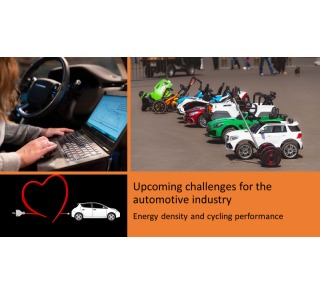The future-oriented studies show that the upcoming challenges for the automotive industry are intimately linked to those of electric power chain. In this landscape, batteries are the most expensive part, but also the one limiting performances of vehicles.
Battery capacity in terms of energy density and cycling performance are the main challenges to come for R&D projects. Many options are explored to introduce new battery technologies which must be less expensive but with more autonomy.
Among the many R&D projects in progress, some seem close to an industrial and commercial success in the 5 to 8 years to come.
Battery technologies with silicon anode could increase energy density by 40% as well as allow fast charge (75% in 5 minutes announced by some manufacturers). Cycling performances are still a very sensitive issue for this technology.
The so-called solid-state batteries are simpler, more compact and they offer high energy density (500 Wh/kg and 1 200 Wh/l announced by some manufacturers). They are using fabrication processes similar to Li-ion batteries. The last technological advances presented in terms of power in a low temperature environment and life cycle are very encouraging and let us hope for an industrial deployment in the years to come.
Lithium-sulphur batteries might have an energy density increased by 50% (450 to 500 Wh/kg) but are more cumbersome than solid-state batteries and their cycling performances are still under assessment.
Among other battery technologies that could be available in large scale in the future, we can mention Sodium-ion batteries. In that case, lithium is replaced by sodium, one of the most common chemical element in the planet. Tiamat Energy, founded in 2017, based its work in the research studies of CNRS and CEA, to which easyLi participated, announced recently its goal to realize extensive tests.
Other technologies are being studied for long term market opportunities, like high voltage li-ion batteries (average voltage > 4.5V between electrodes), metal-air technologies (zinc-air) or Lithium air batteries.
This list is far from exhaustive!
Any questions or additional information needed?
Contact us! contact@easylibatteries.com
